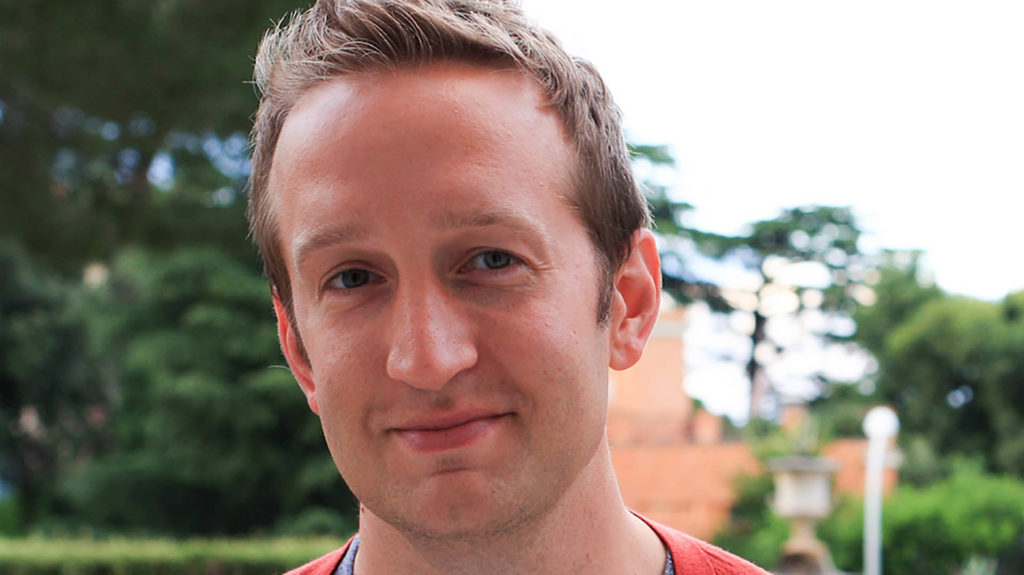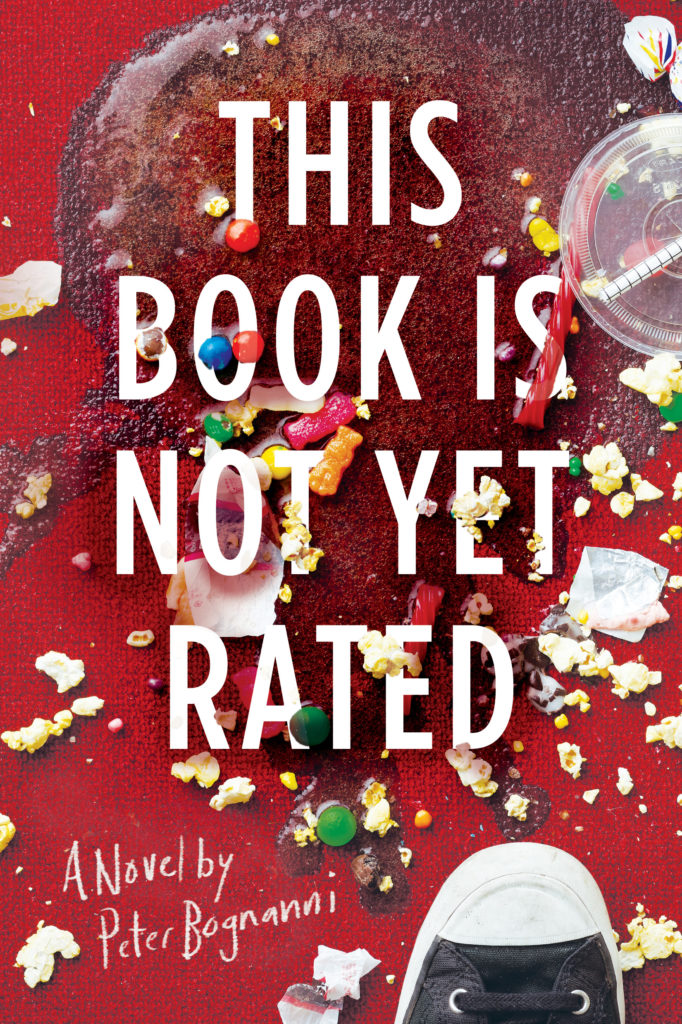This Book is Not Yet Rated: Peter Bognanni’s Newest YA Novel Coming this April
Contact
The Words: Macalester's English Student NewsletterSenior Newsletter Editors:
Birdie Keller '25
Callisto Martinez '26
Jizelle Villegas '26
Associate Newsletter Editors:
Ahlaam Abdulwali '25
Sarah Tachau '27

Jen Katz ’19
Films, friendship, and a failing business are central to Peter Bognanni’s newest novel, which is set to be released on April 9. Bognanni, author of The House of Tomorrow (2010) and, more recently, the young adult novel Things I’m Seeing Without You (2017), explores the many meanings that movies can hold for people and the communities that spring up around them. The Words sat down with Bognanni to learn more about the inspiration for this book and what may be in store next. This interview has been edited for clarity and brevity.

Where did the idea for the book come from?
[It came] from a relatively personal place. The book is a lot about someone who understands the world, understands grief, and is also mourning all of this through movies, and especially had a really strong bond with his father through movies, and that’s pretty similar to my own experience. His father in the book has died and he’s grieving him through movies; that’s not the case in my life, but my dad and I bonded through [movies] growing up.
It’s also based partially on the time I spent working at this independent movie theater called the Oak Street Cinema, which used to be in Dinkytown right after I graduated from Macalester. I had two jobs: I was a children’s book editor by day and showing movies at the Oak Street sometimes by night. It was a really funny place—it was completely falling apart, not very well funded, we had a rat problem. There was a really interesting cast of characters that I worked with.
I was waiting for a story, and I got this idea one day when I was just fiddling around with some of it… What if one character’s whole world is consumed by watching films, but he has a childhood friend who’s actually in them? So the core relationship in the book is the main character, Ethan, getting back in touch with a girl that he was really good friends with when he was young and has been spit out the other end, and has moved back to their hometown. The movie theater is going out of business, and he tries to enlist her to help him out.
There’s two sides of the film world in it: there’s being obsessed with watching movies, and actually being a part of them. And her character was inspired by me being on set watching The House of Tomorrow filmed, which had a lot of teenage actors in it, and I would watch them talk to each other and hang out off camera, and I thought, “What a weird teenage job to have.” When I was a teenager, I had these menial jobs, and that’s what I think of when I think of teenage jobs. How weird to be a really well-paid, valued, internationally known figure at the age of 16 or 17.
I talked to a lot of the actors who worked on that film and most of them did consider it work. Most of them had been doing it since they were little kids. I think they liked it, but it was a job to them, which I think is kind of mind-blowing.
What did you learn from having been on both sides of the movie experience?
ּBeing on set was really fun. I think most people think that it’s incredibly tedious, actually, when they go to a set because there might be 16 takes of somebody opening a door, so actually being there isn’t super exciting every day. It’s pretty meticulous work, but I think in that case it was fun for me because all of it was coming from stuff from my head that I was now seeing in real life. That probably made it more interesting.
Before all of that, I was obsessive about watching movies. I used to go to this video store in my hometown of Des Moines called Video Warehouse—a really unassuming name. Of course it’s out of business now, but they were the only place in Des Moines at that time that had this huge catalog of foreign film and indie film: stuff that would one day become the Criterion Collection but at that time was just a weird videotape with lots of scratches and tracking problems.
My dad got me into it because he was a huge film buff and wrote film reviews in college, so he’d be watching lots of strange age-inappropriate things when I was a kid, and I was just along for the ride. When I became a teenager, I would go to that video store and seek out the weirdest, most obscure stuff I could find and watch everything. If I were a parent of myself back then, I might have been concerned about me and how much time I spent doing that. I think I was mostly just interested in the art of it, but at the same time, I spent a lot of time in a dark room watching movies when I could have been doing other things, and that’s a problem that Ethan has, too. And he might need to break out of it.
Like avoiding real life.
Yeah. Or living in a world that makes it feel like his dad is still there, instead of dealing with the reality that he’s not.
How do you think movies relate to mourning?
I’m a pretty sentimental person about movies. I feel like the movies that I really liked at a certain time, or watched with someone, or have a memory of have a pretty strong emotional impact on me. I mean, people go to the movies and feel really strong emotions—even people who you would not suspect of that, so I think [movies] operate that way for a lot of people, but probably everybody has some experience where they saw something for the first time and they connect that experience with another person. Like either someone who said, “Hey, watch this,” or someone that you saw it with or someone who maybe took your taste in a different direction.
I feel like I still rewatch things from when I was younger and I have connections to people through that experience, so I think that’s what the character’s doing, and is trying to keep his father’s memory alive in that way.
Was the process of writing this book more personal than your other books?
I feel like there’s always some personal aspect, like sometimes it’s the material [like in This Book is Not Yet Rated]. But other times, even if it’s something that I don’t have any experience with, like growing up in a geodesic dome, there’s always some emotional connection. I don’t know if it’s been more personal, but it’s probably mined the experience of my own adolescent years more literally than anything else I’ve written.
Do you think you’ll keep writing YA lit?
It’s funny, I go back and forth about that every day. I keep saying that I want to do both, but I keep having more ideas for YA books.
I feel like I’m in a rhythm right now of writing [YA books]. I really like the idea of writing books that I would have wanted to read at that time that I don’t think exist or existed, so I’m filling up that hole. I don’t know how long that will take, but I also feel like I’m way more of an adult than I’ve ever been right now—like, I have two kids, and I want to write about that stuff, too.
For me, though, I feel like I need a little more distance. It’s finally become easy for me to write about things that have happened to me and things that I cared about when I was 18, so maybe when I’m 60, I’ll be able to do that about my 40s. I don’t know! It takes a while to get the right perspective.
What’s the difference in the feedback you get for your YA novels and your adult novels?
Actually, the world of hearing from people who have read your books is way better in YA because people experiencing art at that age have really passionate connections with the stuff that [they] like when they’re the first books that you really loved, or the first band that you really loved. Those [connections] don’t happen halfway. I feel like adult readers have had time to let those things become less important in their lives. They might have a really strong connection to a book, but it’s not the one thing consuming them, whereas that might be the case hearing from a teenage reader.
So the readers that I hear from are incredibly enthusiastic, but then you also get teenager readers reviewing your stuff on their blogs who totally hate it, and all of that passion is going in a different direction. That’s interesting, too, actually.
One final question: what’s the best movie you’ve seen lately?
I’ll give a YA answer: it was Eighth Grade. Oh my God, that was so good. I was watching it, and it ended, and I was white-knuckled. But what actually happened in that movie? And I was like, “Oh, yeah. She went to the pool and the mall.” But the stakes feel so high! And I think that it does something that I would love to be able to do in my YA books, which is to put somebody back in that position of how intense some small moment that feels like it’s life-or-death is at that age.
The Words extends our profound gratitude to Professor Bognanni for his time, insight, and humor. Common Good Books will be hosting the official book launch for This Book is Not Yet Rated on Wednesday April 10 at 7:00 p.m. Make sure to follow the Macalester English Department on our Facebook page and our Twitter page for more information about This Book is Not Yet Rated.